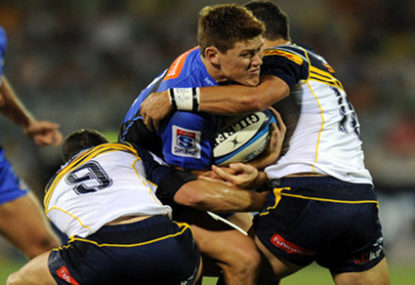The most telling moment of an opening round of patchy quality for Australian sides in this year’s Super Rugby tournament were the boos from the home crowd that broke out during the Brumbies versus Force game in Canberra on Friday.
They would have made for painful hearing in the nation’s capital, but they would have been equally as unpleasant on the ears of those who run the affairs of Australian rugby in North Sydney.
Expansion has been the philosophy with regards to Australian provinces since 2006, with the addition of two new franchises. There is another less pleasant term for it – dilution.
The domestic talent pool is too thinly stretched for five teams.
Despite a sympathetic host broadcaster talking them up, some of the least appealing games in recent years have been the all-Australian contests. And it is more than just a perception. Three out of the bottom four teams in last year’s competition were Australian.
Of course, there was always a large “build it and they will come” element to the expansion project, as well as supplying even numbers to the conference system introduced last year. Implicitly, the rewards on offer are from future gains – building player depth and competition.
These are admirable aims but in the present the growing pains are tangible.
Brumbies coach Jake White won a World Cup. The man can coach. And his outstanding Springboks side has never really been given the credit they deserved. They had more dimensions than their detractors allege. Bryan Habana did not score all those tries from intercepts alone.
Similarly, to watch a Richard Graham side is to see one with sound structure, especially among the forwards. It is true that there is sometimes an over-reliance on the boot, particularly in the Western Force’s game against the Waratahs in Sydney last year.
But you must also recognise he has an eye for pace and power out wide, eliciting career-best efforts from David Smith last year.
The point is neither would opt for the level of inhibition their sides showed in round one if there weren’t other factors in play. White must mould something from a bunch of keen but raw – and in some cases limited – players whose confidence he knows could be damaged by early setbacks.
Graham must contend with the loss of two No.10s and a back-line division that is long on perspiration and short on inspiration.
Exhortations from head office for all five teams to play attractive, winning rugby are one thing, but the question of cattle must be considered.
At times, the standard was lamentable. Not only was the kicking frequent but it lacked quality. The pace was pedestrian. Also, the broadcast schedulers had inadvertently been cruel on both sides.
The game directly followed the vivid Blues versus Crusaders game, which for consecutive years has made a mockery of the excuses about round one matches being necessarily rusty. At least Dan Palmer appears to be making strides. The Wallabies need a cornerstone like no other and on Saturday Benn Robinson again showed James Slipper to be some way off.
The groans from the Brumbies crowd can’t be put down to modern impatience either. Dissatisfaction has been building for a while. The crowd figure of about 14,000 will tell you that and it is easy to understand the reticence of the absent. Since Matt Giteau’s departure for the Force the Brumbies have bounced around from 5th to 13th.
Both coaches face a huge challenge in making their sides relevant to the finals race. It will weaken the hand of the Force as they attempt to re-sign David Pocock. It cannot be easy persuading outstanding players that their futures are at a club with only an outside chance of contending for the big prize.
Regrettably, there are too many Wallabies front-liners who fall into this category. Optimistic Melburnians will demur, but James O’Connor and Kurtley Beale will not hold up the Super crown, this year or next.
Yet these are the players you want to be playing in finals each year and establishing a winning habit. Moreover, they develop as players when surrounded by quality.
Of course, the Reds’ 2011 title argument is the counter-argument that suggests everything is rosier than painted here. But put that down to an exceptional Queensland effort and the introduction of the new conference system.
Reds fans detest such references, believing it to be a Trojan Horse argument that leads to the conclusion they were fortunate. It is not an either/or argument.
They deserved their title but it is also undeniable that 10 points accrued against the substandard Rebels eased their passage to the all-important home finals. Sharks coach John Plumtree is already railing against the intensity of the South Africa derby.
The excellent Reds will give it a crack again this year but their dynastic claims will be subject to the same tests of depth this year that will hurt the other provinces.
It is also a matter of time before officialdom loses patience with an out-gunned front row that has a habit of hitting the deck under pressure rather than be shunted backwards.
In the 2000-06 period of three Australian provinces in Super Rugby the Wallabies played 70 times for 43 wins, 26 losses and one draw at a win rate of 62.14 per cent.
In the Force/Rebels period from 2006 to present the record stands at 81 games, 49 wins, 30 losses and two draws at a win rate of 61.72 per cent. The data is not yet conclusive but the trend certainly isn’t upwards.
There is much work to do yet before expansion can be regarded as an intrinsic good.
This is the first of a new weekly column for The Roar by Paul Cully. He joins our expert Rugby team of Spiro Zavos, David Lord, Brett McKay, David Campese, Murray Mexted, Matt Hodgson, Andrew Logan and the ever-knowledgeable community of Roarers.





























































































